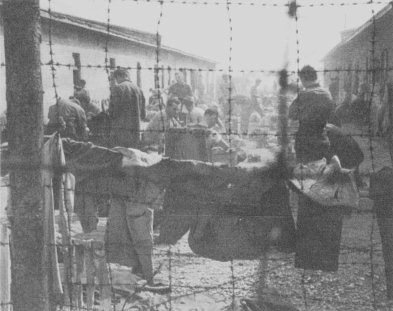

 |
 |
| Stalag VII A: Oral history |
|
Part I: We Arrive at Stalag VII
A Source: |
A Lesson In Rule-KeepingBy Robert D. ReevesThe latrine was so dreadful, I once chose to break the rules by urinating onto the ground outside the walls of the building. Unbeknownst to me, I was being approached from behind by the patrolling guard and his Doberman Pinscher! The German allowed his dog to jump me from behind and knock me down. I rolled over and the Doberman stood on my chest with his front feet, snarling and lunging at my face. The guard toyed with the leash, keeping his vicious animal just enough in restraint to prevent the dog from biting and mauling. After that, I tended to use the bathroom facilities provided to me by the Germans. 
In all my time of captivity, I had the opportunity to take only two showers, although I did occasionally have a wet-down from a pan of water. Before we were allowed to enter the shower area, we were herded into a room, told to undress, and draped all our clothes on hangers. The hangers were placed on a moving chain that carried them into a gas-filled chamber to be deloused. We were also inspected for lice and ticks before our shower. If found infested, the guards would shear our hair and smear on some badly-smelling, dark, greasy paste. I was subjected to that treatment once myself. The showers (both of mine) were glorious. We used our own Red Cross soap, and the Germans' hot water. Naturally, they didn't allow us to shower long enough to suit us. Our daily rations of food were neither generous nor nutritious. Breakfast consisted of a cup of that ersatz coffee that was more suitable for shaving than drinking. Supper was an inch-thick piece of hard, brown bread and an unsigned, boiled potato. For noontime, we always had the concoction they called soup. It was usually a very watery potato soup with an occasional green bean. Once a week, we got a ration of meat; a one-inch thick slice of bologna about two inches in diameter. Our barracks name for this bit of nourishment is not one I'd like to share with you. Most other food I got had to be begged, bartered, or stolen from the Germans - or received from the International Red Cross. No Mail From HomeI sent many letters home to Gridley during my imprisonment and it appears that most of them arrived. I was sent letters and packages from home but received none of them. Letters had been returned to the senders and, if the packages had arrived in Germany at all, it's certain that they were confiscated, and the contents used by the Germans. My mother was surprised by a number of letters and postcards from residents of the East Coast of the United States. These good Samaritans were passing along short-wave radio messages they had received that I was in good health and hoped to be home soon. I have no idea of the source of these radio broadcasts. Perhaps the Germans were in the custom of sending them to the U.S. as propaganda. The Red Cross
We were fortunate at Stalag VII-A to receive intermittent parcels from the International Red Cross. We were comparatively close to their headquarters in Switzerland and were among the first on the supply route. We were supposed to each receive a full parcel every week but six of us shared one package. This practice only changed once when, at Christmas, the Germans allowed two of us to split one parcel. The Red Cross packages varied, but usually contained cans of coffee, cheese, and powdered milk, a hard chocolate bar, and cigarettes - all of which we split six ways. There were usually five packs of cigarettes, so each man got about 16 cigarettes per week. Cigarette packs, by the way, had the tops cut off them. We were told this was so they couldn't be easily stockpiled for escape purposes. Since I didn't smoke, I traded Milt my share of cigarettes for his share of chocolate. Interestingly, our weekly Red Cross packages provided us with the POW legal means of exchange. It must be noted here that, in 1945, there was absolutely no perceived risk in the smoking of cigarettes. As a matter of fact, it was actually believed they contributed to good health and relaxation. Everyone, including German guards and civilians, wanted cigarettes. So, there was always a market for them - both in camp and when we were out on work details.
|
| Last update 9 May 2001 by © WebTeam Moosburg (E-Mail) - All rights reserved! | |||